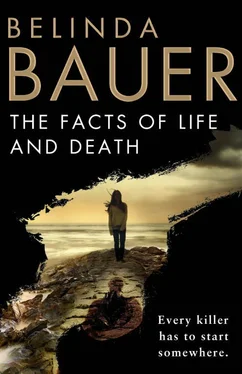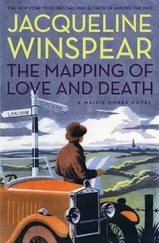Daddy pulled open the drawer once again and took out the black leather gunbelt. He hitched it loosely, so that the holster hung low on his hip.
‘Can I tie the string?’ said Ruby, kneeling up beside his leg.
The leather thong was difficult to wrestle into a knot and turned into a loose half a bow.
‘Nice tyin’, young ’un.’
Ruby beamed at up him. ‘Sure, JT.’ She tried the accent, but it wound itself around her tongue like a cat and came out in a miaow.
Daddy used to have a gun in his gunbelt. Not a real one, but that didn’t matter – the government had made all the Gunslingers hand in their guns just because one stupid man shot some people miles away. And the man wasn’t even a cowboy, so it was really unfair.
But even without a gun, something about Daddy’s hat and his cowboy voice and his unshaven jaw always excited Ruby in a way she couldn’t put into words. He looked like a film star. Even the pale scars that curved through his eyebrow and across his right cheek looked good on Cowboy Night. In Ruby’s eyes they almost made him better. More dangerous .
‘John?’ her mother called up the stairs. ‘It’s quarter past.’
Daddy rolled his eyes at Ruby, and Ruby rolled them back. Nanna and Granpa came at half past. Granpa made her sit on his lap, and Nanna’s idea of sweets was fruit.
‘Can I come with you?’ It burst out of Ruby. She’d learned not to ask often, but she hadn’t asked for ages.
Daddy stopped adjusting his belt, and made a face in the mirror that looked like consideration. She held her breath.
‘Not this time, Rubes,’ he said.
‘When?’ she said, emboldened by the pause.
‘When you’re older.’ He always said the same thing.
‘I’m older now. I’m getting older all the time .’
There was a silent moment when Ruby thought she’d gone too far. But then he turned towards her and grinned.
‘No, you’re not!’ he said, and started to tickle her. ‘You’re not getting older!’
She giggled and rolled. He’d forgotten his cowboy accent, and the only burr in his voice was a West Country one, as he made her suffer with joy.
‘You’re my little cowboy,’ he said as she shrieked. ‘You’ll always be my little cowboy.’
‘John? They’ll be here any minute.’
Daddy stopped tickling and sighed, and Ruby flopped on to the bed, wheezing and still giggling on the out-breaths.
‘Big Nose and Ping Pong are on the warpath,’ Daddy whispered, and Ruby laughed. They called them that – just between themselves – because Granpa’s nose was big, and Nanna’s eyes were as poppy as ping-pong balls.
He straightened up. ‘I guess I’ll be headin’ out then,’ he said, back in character. ‘You have fun now, y’hear?’
Ruby made a face. ‘How old must I be before I can come with you?’
Daddy adjusted his belt for a long time, and when he spoke, it wasn’t in his cowboy voice.
‘Don’t rush to grow up, Rubes,’ he said. ‘There’s nothing good waiting for you there.’
He tilted his hat so it was low over his eyes. Then he got his accent back. ‘You stay home, Miss Ruby. Stay out of trouble.’
At the door, Daddy spun on his heel like a gunslinger, and drew on Ruby.
‘Pow! Pow-pow!’
Instead of a six-shooter he pulled a Mars bar from his holster and lobbed it gently to her. She gasped with delight – then shushed as he raised a secretive finger to his lips.
‘Don’t tell Mummy,’ he said.
Then he tipped his hat to her one last time and jig-jogged down the stairs, whistling ‘Red River Valley’, because it was her favourite song.
Ruby’s smile faded with the tune.
How could Daddy say she shouldn’t rush to grow up? It was all right for him to say! He’d probably forgotten what it was even like to be little, with all the fatness and the bullies and the homework.
She thought of all the good stuff waiting for her when she got older. The first thing she would do was buy a pony so that when she got a job she could ride it to work and to the shops and hitch it up outside so she could see it from the window. And with the money she made from doing… something … she’d buy her own custard creams and not have to search every time for where Mummy had hidden theirs. She’d live in a warm house in a sunny field, miles from trees, where mould didn’t blacken the walls and where the wind never squealed through the windows.
Daddy must be wrong about growing up.
She couldn’t wait to get there.
LEGEND HAS IT that in AD 878, Vikings under the leadership of Hubba the Dane landed thirty-three ships right here, at the broad mouth of the River Torridge, and headed up the steep hill to launch an assault on Kenwith Castle. They barely got a mile before they met the English defenders coming the other way. The king’s men had the high ground and the raiders were repelled, but not before the battle claimed the lives of thousands of winners and losers alike.
The dead victors were carried back to Kenwith under the first Eagle standard ever captured, while the Danes were buried where they fell – in mass graves dug easily in earth so softened by carnage that it is known to this day as Bloody Corner.
Since then, not much had happened in Appledore.
For nearly twelve hundred years, the little village serried its way up that same hill like a much slower, more respectful invasion. The first row of cottages rose straight from the muddy estuary, and the tide lapped against painted walls and seeped into basements on a twice-daily basis.
Appledore had a post office, three churches and six pubs: the usual ratio. In summer, little galleries and gift shops opened in people’s front rooms, selling handmade and home-made gifts, although the hands and homes were mostly Chinese. Not like the Hocking’s ice cream, which was made right here in the village from great golden mountains of real butter, and sold from a fleet of vanilla vans.
And not like the ships.
Appledore folk had been building boats for generations, and at its peak Appledore Shipbuilders had employed over two thousand men: so many that one village alone could not satisfy the demand, and men had come from miles around, working shifts around the clock, and riding to the yard on cheap old step-through scooters that cut through sleep like 4am buzz-saws. For half a century the huge iron shed had dominated the river and made bonsais of the trees. Great warships slid from it and into the river, causing passing yachts to bob and pitch like toys. The dry dock had once been the biggest in Europe, and it had seemed that the good times would never end.
But everything ends – especially good times.
And when they ended in Appledore, fifteen hundred men lost their jobs.
Overnight.
Fifteen hundred breadwinners. Fifteen hundred skilled welders and fitters and carpenters and machinists, suddenly unemployed in a place where the job centre only regularly offered bar work, labouring and babysitting.
Many of the men never worked again. Not legally, anyway. They missed the work and the money, of course, but more than that, they missed their mates and the way men could be when they were with other men – which was not the same way they had to be when they were with women.
So they found other places to meet. Some of them met in the bookmaker’s, some in the pubs, some in the snooker halls.
And some of them joined the Gunslingers.
The Gunslingers were a loose group of maybe twenty men who, once a week, dressed up as cowboys and met at the George in Appledore – just as the Shootists did at the Bell in Parkham and the Outlaws did at the Coach and Horses in Barnstaple.
Читать дальше












